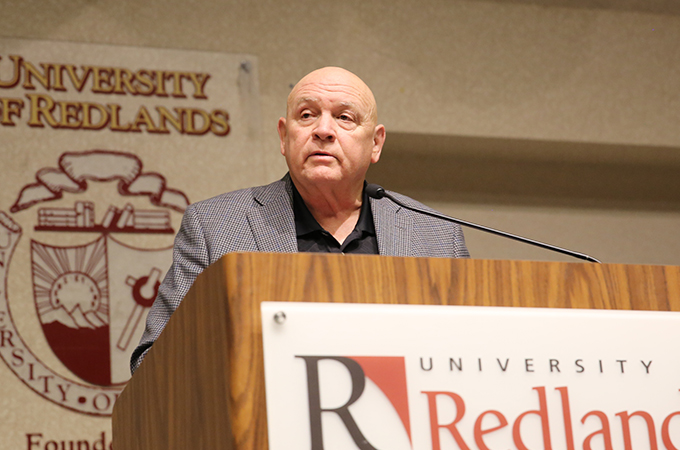Why is the second largest religion in the world so often misunderstood? Dr. Charles Kimball, professor and director of Religious Studies at the University of Oklahoma, began to answer this question during his November 14 talk at the second annual Bridges of Peace from Shadows of Grief event at the University of Redlands.
Kimball, who received a doctoral degree from Harvard in comparative religion with an emphasis in Islamic studies, began his talk with background on the state of interfaith relations. “The populations of Christians and Muslims combined represents around 45 percent of the global population,” he said. “I believe very strongly that the ways in which Christians and Muslims interact with one another will have a dramatic impact on these religions and the world in the coming years.”
Kimball explained that Muslims and Christians have interacted with each other for centuries. Currently, there are over 15 million Arabic-speaking Christians living in the Middle East. Islam, however, was often viewed as a threat by early European Christians, especially as Islam became the only religion to challenge the success of Christianity in Europe.
Because of this, Kimball noted that many of the great European thinkers had little good to say about Islam. “In Dante’s Inferno, the prophet Muhammed is placed just a couple rungs above Judas in the depths of hell,” he said. “Martin Luther, who greatly influenced American Protestantism, wrote three books attacking Islam and claimed that the Qur’an was a vile and shameful book.”
This way of thinking influenced generations of Europeans and eventually many Americans.
Three components are necessary to unlearn these unhelpful historic biases, according to Kimball:
- Seek impartial education. “It’s important that we continue to pursue education and dismantle stereotypes in a thoughtful and level-minded way in colleges, universities, churches, synagogues, and mosques,” he said.
- Reject the belief that Islam is monolithic. Kimball noted that comments generalizing Islam or any other religion are almost always inaccurate.
- Work to develop interfaith relationships within the community. Participating in holiday and other events such as a Passover Seder or Ramadan Iftar (an evening meal to break the fast) or building Habitat for Humanity houses are great ways to interact with people of different faiths. “When you get to know people, it is much harder to maintain simplistic stereotypes about those who are different than yourself,” said Kimball.
In his final remarks, Kimball emphasized the importance of being vocal and correcting misconceptions that people have about different religions. “Don’t be afraid to speak up,” said Kimball. “Challenge and confront misconceptions and stereotypes.”
A response to the San Bernardino terrorist attack in 2015, the University of Redlands Bridges of Peace series, cosponsored by multiple organizations on campus, seeks to enhance positive interfaith relationships, support nonviolent attitudes and behaviors, and promote peace.






